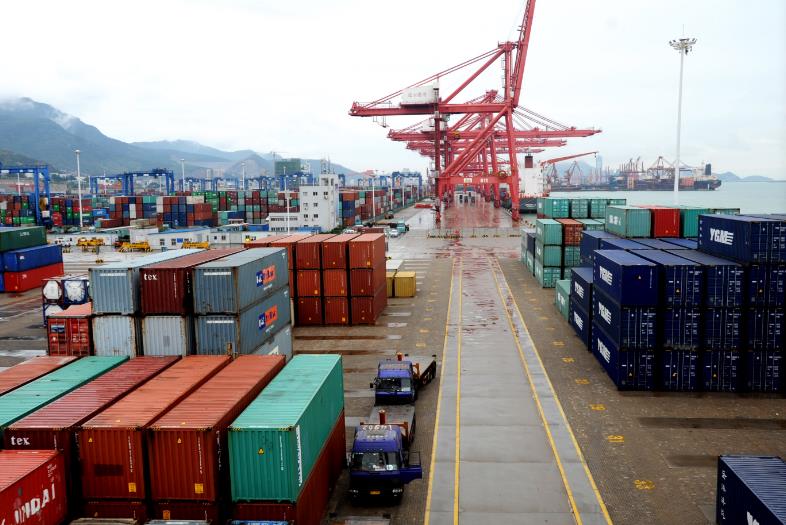Media Report

- The New York Times reports: "China reported on Wednesday that its economy grew 6.7 percent in the third quarter compared with a year ago. That matched economists' expectations exactly, and was identical to the pace China set in the first and second quarters of this year. In economics, stability like that is remarkable — and usually not to be believed. Economists often look beyond the official numbers to find alternative ways to gauge the Chinese economy. Other figures and facts on the ground suggest that a lending binge that China has unleashed in recent months is helping to sustain growth. But by historical standards, China's growth is slowing down. This year's growth is set to come in at a pace slower than last year's, which was already the weakest pace in 25 years....That is a major concern for central banks, economists, investors and corporate executives around the world, as China has been a major engine of growth for decades. Their main question: What happens next?"
- Bloomberg View comments: "Both Hillary Clinton and Donald Trump have made clear, to varying degrees, that they're suspicious of big free-trade agreements....At a time of major economic and political realignments in the world, the U.S. is in danger of alienating allies and fomenting uncertainty in its relationships with major trading partners. Once, this might not have mattered, as no other nation could rival the U.S. as the world's economic and political hegemon. But times have changed. If the U.S. voluntarily withdraws from the world, one country -- China -- is better positioned than any other to fill the void....China no doubt recognizes the opportunity presented by growing protectionist sentiment in the U.S. Even before Trump's rise injected an isolationist streak into the campaign, the Chinese government had grown more disciplined and savvy in its approach to international engagement....Bit by bit, this could undermine the system of global governance upheld by the U.S."
- The Washington Post reports: "The state-owned Chinese media that sought to portray Duterte's predecessor and the arbitration panel as American puppets this summer have now rolled out what Chinese media scholars describe as a rare welcome for the Philippine president, who this week downplayed his country's dispute with Beijing over South China Sea territory. But the overtures have drawn criticism of Duterte at home in the Philippines, where the public is wary of taking a deferential attitude to a country regarded as a bully....Zhan Jiang, a journalism professor at the Beijing Foreign Studies University, said he has rarely seen a state visit accompanied by so many interviews from state media. 'The visit has strategic significance and China wants to express its welcome, but Duterte also has a message to convey and he's willing to give that same message to different Chinese outlets over and over,' Zhan said. 'In the years I've followed the Chinese media I don't think I've ever seen that.'
Calendar
- 2016-10-18 Kenya: China petitioned to stop building railway in park
- 2016-10-17 China courts Philippines leader Duterte amid signs of US rift
- 2016-10-16 Philippine Leader Rodrigo Duterte Rolls Dice With Embrace of China
- 2016-10-14 Study: China's 2-Child Policy Won't Lead to Population Boom
- 2016-10-13 US Reserves Right to Punish China Firms Working With NKorea
- 2016-10-12 Russia Says It’s Joining China to Counter U.S. Missile Defense
- 2016-10-11 For China’s Leaders, U.S. Election Scandals Make the Case for One-Party Rule
- 2016-10-10 Tourists Behaving Badly: Name-and-Shame Effort Fails to Fix China’s Image
- 2016-10-07 How a Trump or Clinton presidency could hurt China's economy
- 2016-10-06 Chinese People Feel Good About Their Increasingly Assertive Country, Report Finds
News
- Bloomberg Markets China Holdings of U.S. Treasuries Drop to Almost Four-Year Low
- Reuters Dollar recedes from seven-month peak, lifts oil
- The Wall Street Journal Economists Question China's Consistent Growth Numbers
- The Washington Post China economic growth holds steady as retail spending rises
- Bloomberg Markets China Growing at 6.7% Opens Window to Deliver Debt-Curb Vow
- The Financial Times Property risks loom over China's economy
- Reuters China third quarter GDP grows 6.7 percent as expected as construction booms, debt rises
- The New York Times As China's Economy Slows, a Look at What Could Happen
- The Washington Post Duterte's deference delights China but is questioned at home
- The Wall Street Journal Economists Question China's Consistent Growth Numbers
- The New York Times China's Crackdown on Crown Resorts Shakes Casino Industry
- TIME 'I Am Chinese': Philippine President Rodrigo Duterte's Awkward Charm Offensive in China
- The Wall Street Journal Crown's Luck Runs Out as China Widens Casino Crackdown
- The Guardian Wang Jianlin: does China's richest man have a plan to take over Hollywood?
Commentary
- The Diplomat Can China Reshape Asia's Security Architecture?
- The Economist: Free Exchange China's uncannily stable growth versus the price of reform
- Bloomberg View Who Wins if the U.S. Pulls Back? China
- The Wall Street Journal: China Real Time Economists React: As China Growth Concerns Ease, Risks Rise
- The Guardian After China's crackdown, can Packer's Barangaroo casino survive without pokies?
- Foreign Policy: Passport IKEA to Elderly Chinese Singles: Get a Room
- The Wall Street Journal: China Real Time Protecting Workers' Rights in China: Q&A with Aaron Halegua
